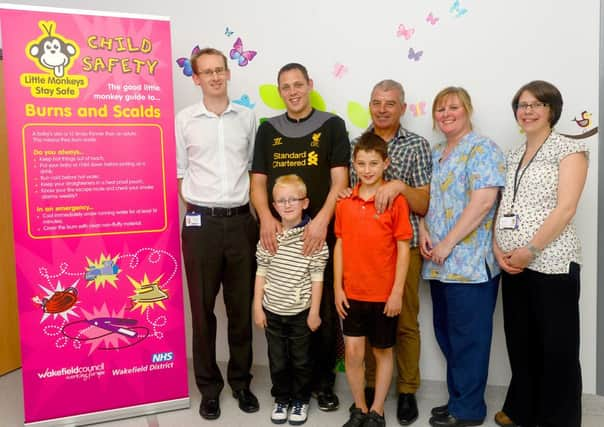Scalds awareness campaign launched


Wakefield Council and district NHS bosses are offering advice on how to prevent children being burnt and raising awareness of how to give first aid.
They said hot drinks were the main cause of youngsters aged under five being scalded, and urged parents not to leave cups of tea and coffee unattended.
Advertisement
Hide AdAdvertisement
Hide AdIf children are scalded, cold water should by run over the burn for at least 10 minutes to reduce skin damage.
Families gathered on Monday for an advice session at the Regional Burns Unit at Pinderfields Hospital.
Burns unit patient Sean White, 11, suffered a scald to his leg when a hot cup of tea fell on him at his home in Kirk Smeaton, near Pontefract.
His mum Elaine White advised other parents to keep hot drinks away from children.
Advertisement
Hide AdAdvertisement
Hide AdShe said: “Sean has to come in every two or three days to have his bandages changed.”
Jane Stark, the council’s health improvement practitioner specialist, said: “Babies and toddlers find everything in their world interesting and colourful, and they naturally love to explore and copy adults.
“However, they do not understand danger and this includes whether something is hot or cold.
“A steaming cuppa left for a moment on the windowsill or a bubbling pan of food on the cooker is especially interesting to them.
Advertisement
Hide AdAdvertisement
Hide Ad“In a split second they catch you by surprise, stand on their tip toes and get hold of that drink or pan handle. Unsurprisingly, most burns and scalds happen in the living room or kitchen.”
Miss Stark said even after 20 minutes a hot drink could still cause serious burns because babies’ and toddlers’ skin was 20 times thinner than an adults.
She added: “It will cause more pain and damage to them than it would to us.
“Although hot drinks and food cause the majority of serious burns and scalds, hair straighteners, irons, radiators, hot bath or tap water and other household appliances are responsible.
Advertisement
Hide AdAdvertisement
Hide Ad“Keep one step ahead of young children, move things out of their reach. Don’t let them take you by surprise.”
Events will also be held at district children’s centres during Child Safety Week, which starts on Monday.
There will be first aid advice and equipment to reduce accidents like stair gates and medicine boxes will be on display.
The Regional Burns Unit at Pinderfields Hospital serves a population of around 3.5m people in Yorkshire and North Lincolnshire.
Advertisement
Hide AdAdvertisement
Hide AdThe service is accessed by 19 accident and emergency departments.
The unit looks after around 200 patients a year, most with major and life-threatening burns, along with around 1,800 outpatients.
The unit has two intensive care beds and five adult beds for burns patients.
Youngsters with burns are treated at a separate children’s ward with five paediatric beds.
Advertisement
Hide AdAdvertisement
Hide AdThe unit also runs adult and children’s outreach services to help people being looked after at home.
A Burns Club also gives young people with major burn injuries the chance to meet and go on activity trips.